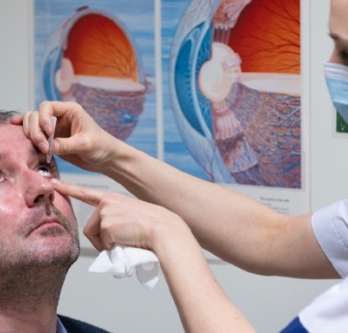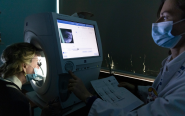We're hiring ! Join us and make a difference in our hospitals
Ophthalmology
Contact
Our role
Ophthalmology is the medical speciality concerned with the eyes. Our aim is to improve visual health and treat eye disease.

"Our care is comprehensive: from screening to medical and/or surgical treatment. The academic aspect is and must remain central. We have doctors who are experts in modern treatments designed for all stages of life."
Our specialities
The Ophthalmology Department is subdivided into a number of elements:
- The Orbito-Palpebro-Lacrymal and Onco-Ophthalmology Clinic is concerned with problems of the eye socket, eyelids, tear glands and ducts as well as with the orbital mass.
- The Glaucoma Clinic is recognised nationally for its expertise; patients are referred to this clinic from throughout Belgium.
- The Paediatric Ophthalmology Clinic prevents, screens for and treats eye problems in children. Examples: refraction problems (myopia, hypermetropia and astigmatism), strabism, amblyopia, eye development anomalies, infectious diseases, etc.
- Corneal medical treatment proposes a range of treatment to stabilise and/or treat degenerative or progressive diseases on the surface of the eye.
- Corneal surgery is fast developing and carries out all available cornea grafts.
- Refractive surgery seeks to dispense with optical corrections such as spectacles or contact lenses.
- Retinal medical treatment is concerned with pathologies such as age-associated wet or dry macular degeneration (AMD).
- Retinal surgery is used, for example, to correct detached retinas or to place or change intraocular transplants, etc.
- Neuro-ophthalmology treats disorders of the optic nerves and all the various ocular disorders associated with a neurological pathology (SEP, stroke, brain tumour, etc.)
Some diseases (diabetes, tuberculosis, Sjögren's syndrome, etc.) can affect the eyes and threaten vision. This is why the Ophthalmology Department cooperates with other departments such as endocrinology, rheumatology, paediatrics, haematology, etc.
Our team

Our medical specialists

Research
The ophthalmologists at the Erasmus Hospital carry out clinical studies and fundamental research, on:
- vitreoretinal proliferation, in collaboration with the ULB's Laboratory of Physiopathological and Nutritional Biochemistry (LBPN);
- cornea cells, in collaboration with the Jules Bordet Institute's Cell Therapy Laboratory.
Focus
Every year the Ophthalmological Department carries out approximately 2,000 intravitreal injections. This type of treatment can be indicated to treat age-related macular degeneration (AMD), retinopathies associated with diabetes, intraocular inflammation, etc.
Publications
Neuro-Ophthalmological Manifestations in Children with Down Syndrome: Current Perspectives
- Auteurs : Lavinia Postolache 1, Anne Monier 2, Sophie Lhoir 1
- Journal : Eye Brain 2021 Jul 21;13:193-203. doi: 10.2147/EB.S319817. eCollection 2021.
Intense Pulsed Light Therapy in the Treatment of Dry Eye Diseases: A Systematic Review and Meta-Analysis.
- Auteurs : Demolin L, Es-Safi M, Soyfoo MS, Motulsky E.
- Journal : J Clin Med. 2023 Apr 21;12(8):3039. doi: 10.3390/jcm12083039.PMID: 37109374
Experimental Models to Study Epithelial-Mesenchymal Transition in Proliferative Vitreoretinopathy.
- Auteurs : Datlibagi A, Zein-El-Din A, Frohly M, Willermain F, Delporte C, Motulsky E.
- Journal : Int J Mol Sci. 2023 Feb 24;24(5):4509. doi: 10.3390/ijms24054509.PMID: 36901938
Visual field defects and retinal nerve fiber layer damage in buried optic disc drusen: a new insight.
- Auteurs : Nana Wandji B, Dugauquier A, Ehongo A.
- Journal : Int J Ophthalmol. 2022 Oct 18;15(10):1641-1649. doi: 10.18240/ijo.2022.10.12. eCollection 2022. PMID: 36262850